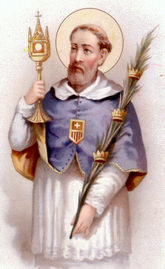Lives of the Saints
Our Models and Protectors
Spiritual Bouquet:
August 31

Saint Raymund Nonnatus
Religious of Our Lady of Mercy
and Cardinal
(1204-1240)
Saint Raymund Nonnatus was born in Catalonia, Spain, in the year 1204. Motherless from infancy, in his childhood he seemed to find pleasure only in his devotions and serious duties. He chose the Blessed Virgin for his mother, almost as soon as the light of reason made this choice available to him. His father, perceiving in him an inclination to the religious state and unwilling to give up his son, took him from school and sent him to take care of a farm which he owned in the country. Raymund readily obeyed, and, in order to enjoy holy solitude, kept the sheep himself and spent his time in the mountains and forests in holy meditation and prayer. He found there an ancient hermitage containing a portrait of his Blessed Mother, and made this his asylum. There the devil found him and, assuming the disguise of a shepherd, attempted to turn him away from his devotions; but Raymund turned his back on his visitor and called Mary to his assistance. The sole name of the Mother of God caused the demon to disappear, and the hermit prostrated himself and blessed Her for Her assistance.
Some time afterward, he joined the new Order of Our Lady of Mercy for the redemption of captives, and was admitted to profession at Barcelona by the holy founder, Saint Peter Nolasco. Within two or three years after his profession, he was sent into Barbary with a considerable sum of money; in Algiers he purchased the liberty of a great number of slaves. When all his treasure was exhausted, he gave himself up as a hostage for the ransom of others, according to the Rule of his Order. This magnanimous sacrifice served only to exasperate the Moslems, who treated him with uncommon barbarity, until they began to fear that if he died in their hands, they would lose the ransom which had been asked for his deliverance. A crier announced in the streets that anyone who mistreated him would answer for it, if he died.
Therefore he was permitted to go abroad in the streets, which liberty he utilized to comfort and encourage the Christians in chains, and to convert and baptize certain Moslems. Learning of this, their pasha, furious, condemned him to be impaled, but his barbarous sentence was commuted at the insistence of those who had an interest in the ransom payments for the slaves he was replacing. He underwent instead a cruel bastinade, but that torment did not daunt his courage. So long as he saw souls in danger of perishing eternally, he thought he had yet done nothing.
Saint Raymund had no more money to employ in releasing poor captives; and to converse with those of the local beliefs on the subject of religion meant death. He enjoyed sufficient liberty nonetheless to continue the same endeavors, and he did so, hoping either for success or martyrdom. The governor, enraged, ordered our Saint to have his lips pierced and padlocked, then to be imprisoned until his ransom would be brought by members of his Order. He remained in jail for eight months before his brethren arrived with the required sum, sent by Saint Peter Nolasco.
Upon his return to Spain, he was nominated Cardinal by Pope Gregory IX, and the Pope called him to Rome. The Saint was on his way, but had gone no farther than Cardona when he was seized with a violent fever. He died on August 31, 1240, in his thirty-seventh year. His face in death became beautiful and radiant like that of Moses when he descended from the mountaintop, where he had spoken with God. A heavenly fragrance surrounded his body, and cures were effected on behalf of those who came and touched him.
Reflection: This magnanimous Saint gave not only his substance but his liberty, and exposed himself to the most cruel torments and death for the redemption of captives and the salvation of souls. But we, alas! do we not, merely to gratify our prodigality, vanity, or avarice, refuse to give even the superfluity of our possessions to the poor, who for want of it are perishing with cold and hunger? Let us not forget the terrible Judgment of the Last Day, awaiting those who neglect their brethren in need. (Cf. Matt. 25:31-46)